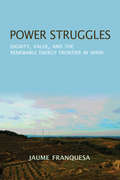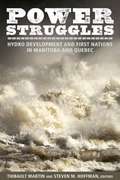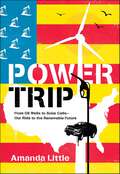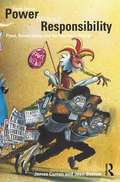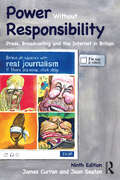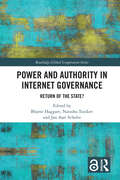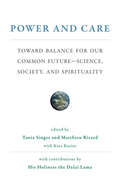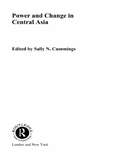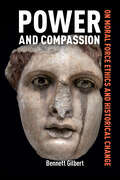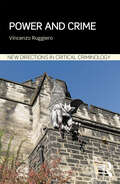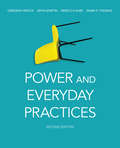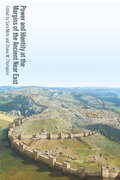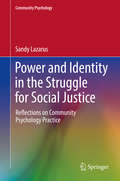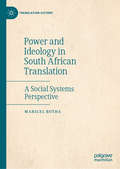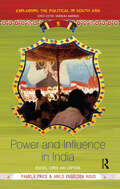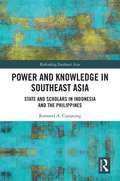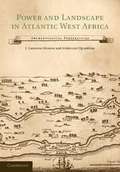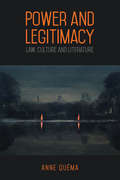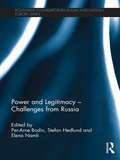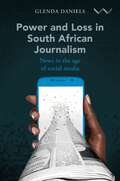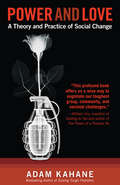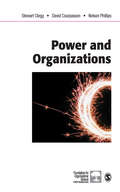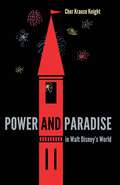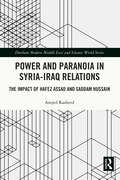- Table View
- List View
Power Struggles: Dignity, Value, and the Renewable Energy Frontier in Spain (New Anthropologies of Europe)
by Jaume FranquesaWind energy is often portrayed as a panacea for the environmental and political ills brought on by an overreliance on fossil fuels, but this characterization may ignore the impact wind farms have on the regions that host them. Power Struggles investigates the uneven allocation of risks and benefits in the relationship between the regions that produce this energy and those that consume it. Jaume Franquesa considers Spain, a country where wind now constitutes the main source of energy production. In particular, he looks at the Southern Catalonia region, which has traditionally been a source of energy production through nuclear reactors, dams, oil refineries, and gas and electrical lines. Despite providing energy that runs the country, the region is still forced to the political and economic periphery as the power they produce is controlled by centralized, international Spanish corporations. Local resistance to wind farm installation in Southern Catalonia relies on the notion of dignity: the ability to live within one's means and according to one's own decisions. Power Struggles shows how, without careful attention, renewable energy production can reinforce patterns of exploitation even as it promises a fair and hopeful future.
Power Struggles: Hydro Development and First Nations in Manitoba and Quebec
by Thibault Martin Steven M. HoffmanPower Struggles: Hydro Development and First Nations in Manitoba and Quebec examines the evolution of new agreements between First Nations and Inuit and the hydro corporations in Quebec and Manitoba, including the Wuskwatim Dam Project, Paix des Braves, and the Great Whale Project. In the 1970s, both provinces signed so-called “modern treaties” with First Nations for the development of large hydro projects in Aboriginal territories. In recent times, however, the two provinces have diverged in their implementation, and public opinion of these agreements has ranged from celebratory to outrage.Power Struggles brings together perspectives on these issues from both scholars and activists. In debating the relative merits and limits of these agreements, they raise a crucial question: Is Canada on the eve of a new relationship with First Nations, or do the same colonial attitudes that have long characterized Canadian-Aboriginal relations still prevail?
Power Trip: The Story of America's Love Affair with Energy
by Amanda LittlePower Trip is an adventurous, wonk-free, big-picture, solutions-oriented narrative by leading young journalist Amanda Little that maps out the history and future of America’s energy addiction. Infused with next-generation candor and optimism, Power Trip examines the ways in which oil and coal have shaped America as an international superpower—even as they posed political and environmental dangers to the nation and the world. Hard-hitting yet optimistic, Power Trip is a manifesto for the younger generations who are inheriting the earth.
Power Without Responsibility: Press, Broadcasting and the Internet in Britain
by James Curran Jean SeatonThis book attacks the conventional history of the press as a story of progress; offers a critical defence and history of public service broadcasting; provides a myth-busting account of the internet; a subtle account of the impact of social media and explores key debates about the role and politics of the media. It has become a standard book on media and other courses: but it has also gone beyond an academic audience to reach a wider public. Hailed as ‘a classic of media history and analysis’ by the Irish Times and a book that has ‘cracked the canon’ by the Times Higher, it has been translated into five languages. This edition contains six new chapters. These include the press and the remaking of Britain, the rise of the neo-liberal Establishment, the moral decline of journalism, the impact of social media and a history of attempts to reform the press. It contains new research on the relationship between programmes, institutions and society. It places key UK institutions in the wider context of international affairs and their impact. The book has been updated to take account of new developments like Brexit and the rise of Jeremy Corbyn and the shift in authority and legitimacy prompted by social media. It does this with a clear explanation of how policy can shape media outcomes.
Power Without Responsibility: Press, Broadcasting and the Internet in Britain
by James Curran Jean SeatonThis book attacks the conventional history of the press as a story of progress; offers a critical defence and history of public service broadcasting; provides a myth-busting account of the internet; gives a subtle account of the impact of social media; and explores key debates about the role and politics of the media.Power Without Responsibility has become a standard textbook on media and other courses, but it has also gone beyond an academic audience to reach a wider public. Hailed as a book that has ‘cracked the canon’ by the Times Higher Educational Supplement, it has been translated into five languages. In 2019, it was awarded the International Communication Association's Fellows Book Award. This ninth edition is based on a major overhaul of its content to take account of new developments (such as generative AI) and new scholarship in the field. It also contains a new chapter on the transformed opportunity for a reformed and buccaneering public service broadcasting in the face of automated misinformation and social division, locally, nationally and internationally.This trailblazing text is essential reading for all students and scholars interested in British media and contemporary media and society.
Power and Authority in Internet Governance: Return of the State? (ISSN)
by Jan Aart Scholte Blayne Haggart Natasha TusikovPower and Authority in Internet Governance investigates the hotly contested role of the state in today's digital society. The book asks: Is the state "back" in internet regulation? If so, what forms are state involvement taking, and with what consequences for the future?The volume includes case studies from across the world and addresses a wide range of issues regarding internet infrastructure, data and content. The book pushes the debate beyond a simplistic dichotomy between liberalism and authoritarianism in order to consider also greater state involvement based on values of democracy and human rights. Seeing internet governance as a complex arena where power is contested among diverse non-state and state actors across local, national, regional and global scales, the book offers a critical and nuanced discussion of how the internet is governed – and how it should be governed.Power and Authority in Internet Governance provides an important resource for researchers across international relations, global governance, science and technology studies and law as well as policymakers and analysts concerned with regulating the global internet.The Open Access version of this book, available at http://www.taylorfrancis.com, has been made available under a Creative Commons Attribution-Non Commercial-No Derivatives (CC-BY-ND) 4.0 license.
Power and Care: Toward Balance for Our Common Future#Science, Society, and Spirituality (The\mit Press Ser.)
by Matthieu Ricard Tania Singer Kate KariusLeading thinkers from a range of disciplines discuss the compatibility of power and care, in conversation with the Dalai Lama.For more than thirty years, the Dalai Lama has been in dialogue with thinkers from a range of disciplines, helping to support pathways for knowledge to increase human wellbeing and compassion. These conversations, which began as private meetings, are now part of the Mind & Life Institute and Mind & Life Europe. This book documents a recent Mind & Life Institute dialogue with the Dalai Lama and others on two fundamental forces: power and care—power over and care for others in human societies.The notion of power is essentially neutral; power can be used to benefit others or to harm them, to build or to destroy. Care, on the other hand, is not a neutral force; it aims at increasing the wellbeing of others. Power and care are not incompatible: power, imbued with care, can achieve more than a powerless motivation to care; power, without the intention to benefit others, can be ruthless. The contributors—who include such celebrated figures as Frans B. M. de Waal, Olafur Eliasson, Sarah Blaffer Hrdy, and Jody Williams—discuss topics including the interaction of power and care among our closest relatives, the chimpanzees; the effect of meditation and mental training practices on the brain; the role of religion in promoting peace and compassion; and the new field of Caring Economics.ContributorsPaul Collier, Brother Thierry-Marie Courau, Frans B. M. de Waal, Olafur Eliasson, Scilla Elworthy, Alexandra M. Freund, Tenzin Gyatso (His Holiness the Dalai Lama), Markus Heinrichs, Sarah Blaffer Hrdy, Frédéric Laloux, Alaa Murabit, Matthieu Ricard, Johan Rockström, Richard Schwartz, Tania Singer, Dennis J. Snower, Rabbi Awraham Soetendorp, Theo Sowa, Pauline Tangiora, Jody Williams
Power and Change in Central Asia (Politics in Asia)
by Sally N. CummingsThis volume offers the first systematic comparison of political change, leadership style and stability in Central Asia. The contributors, all leading international specialists on the region, offer focused case-studies of Kazakhstan, Kyrgyzstan, Tajikistan, Turkmenistan and Uzbekistan, comparing how the regimes have further consolidated their power and resisted change.
Power and Compassion: On Moral Force Ethics and Historical Change
by Bennett GilbertThis book presents a theory of the morality of human relations deeply drawn from widespread spiritual traditions, offering an account of the full range of sociality that comprises our moral life. Bennett Gilbert argues that the dynamic character of our choices and actions is developed as the center of philosophical inquiry into ethics. Relying on the tradition of philosophical personalism, the author reads moral life in terms of the central worth and value of human personhood. This fully relational concept supports a picture of the clash and cooperation of two great moral forces, power and compassion. By combining hermeneutics, first-person philosophy, moral philosophy, and existential philosophy of history, Power and Compassion is a philosophical exploration of the ways in which we use our moral force to create meaningfulness in our collective experience.
Power and Crime (New Directions in Critical Criminology)
by Vincenzo RuggieroThis book provides an analysis of the two concepts of power and crime and posits that criminologists can learn more about these concepts by incorporating ideas from disciplines outside of criminology. Although arguably a 'rendezvous' discipline, Vincenzo Ruggiero argues that criminology can gain much insight from other fields such as the political sciences, ethics, social theory, critical legal studies, economic theory, and classical literature. In this book Ruggiero offers an authoritative synthesis of a range of intellectual conceptions of crime and power, drawing on the works and theories of classical, as well as contemporary thinkers, in the above fields of knowledge, arguing that criminology can ‘humbly’ renounce claims to intellectual independence and adopt notions and perspectives from other disciplines. The theories presented locate the crimes of the powerful in different disciplinary contexts and make the book essential reading for academics and students involved in the study of criminology, sociology, law, politics and philosophy.
Power and Everyday Life: The Lives of Working Women in Nineteenth-Century Brazil
by Maria O. Dias Ann FrostThis book is the study of everyday lives of the inhabitants of Sao Paulo in the 19th century. The book concentrates on the lives of working women--black, white, Indians and slaves and their struggles to survive.
Power and Everyday Practices, Second Edition
by Rebecca Raby Deborah Brock Aryn Martin Mark P. ThomasThis unique and innovative text provides undergraduate students with tools to think sociologically through the lens of everyday life. Normative social organization and taken-for-granted beliefs and actions are exposed as key mechanisms of power and social inequality in Western societies today. By "unpacking the centre" students are encouraged to turn their social worlds inside out and explore alternatives to the dominant social order. The second edition is divided into three parts. Part one teaches students how to use theory and methodology, which are blended seamlessly throughout the text. It shows how to position Michel Foucault and Karl Marx as companions to theorists such as Stuart Hall, while signalling the importance of non-Western and Indigenous knowledges, experiences, and rights. In part two, students explore—and challenge—normativity in relation to the body, gender and sexuality, race and ethnicity, class, aging, and citizenship. In part three, chapters critique everyday practices such as thinking scientifically, practising self-help, going shopping, managing money, buying coffee, talking about Indigeneity, and travelling as a tourist. Each chapter includes thought-provoking exercises, study questions, and key terms that link to the volume’s comprehensive glossary. Instructors are provided PowerPoint slides, a test bank, and a list of online resources that make the book adaptable to online and blended learning environments.
Power and Identity at the Margins of the Ancient Near East
by Shane M. Thompson Sara MohrPower and Identity at the Margins of the Ancient Near East rethinks the dichotomy between antiquated terms such as “core” and “periphery,” explores lived realities in the margins of central authority, and centers those margins as places of resistance and power in their own right. The borderlands of hegemonic entities within the Near East and Egypt pressed against each other, creating cities and societies with influence from several competing polities. The peoples, cities, and cultures that resulted present a unique lens by which to examine how states controlled and influenced the lives, political systems, and social hierarchies of these subjects (and vice versa). This volume addresses the distinct traditions and experiences of areas beyond the core; terminology used when discussing empire, core, periphery, borderlands, and frontiers; conceptualization of space; practices and consequences of warfare, captive-taking, and slavery; identity- and secondary state–formation; economy and society; ritual; diplomacy; and the negotiation of claims to power. It is imperative that historians and social scientists understand the ways in which these cultures developed, spread, and interacted with others along frontier edges. Using an intersectional approach across disciplines, Power and Identity at the Margins of the Ancient Near East brings together professionals from archaeology, religious studies, history, sociology, and anthropology to make new contributions to the study of the frontier. Contributors: Alexander Ahrens, Peter Dubovský, Avraham Faust, Daniel E. Fleming, Mahri Leonard-Fleckman, Alvise Matessi, Ellen Morris, Valeria Turriziani, Eric M. Trinka
Power and Identity in the Struggle for Social Justice: Reflections on Community Psychology Practice (Community Psychology)
by Sandy LazarusThis compelling example of auto-ethnography follows the journey of a psychologist pursuing her career in apartheid-era South Africa—and reappraising her work and her worldview in the post-apartheid years. The author describes her development of a human rights perspective, rooted in an understanding of power dynamics in contexts of oppression, privilege and inequality, as it evolved from theory to real-life practice in academia and the community. Key themes include embedding core principles of social justice, and of learning and teaching, in community practice and policy work, and maximizing community action and participation in participatory action research. And in addition to her recommendations for ethical practice and professional development, the author’s self-reflexive presentation models necessary steps for readers to take in building their own careers. Among the topics covered: Self-reflections on power relations in community practice.Learning about the decolonial lens.Empowerment as transformative practice. Policy work during post-apartheid years.Developing teaching and learning theories and practices. Power and Identity in the Struggle for Social Justice will act as both an interesting and a valuable resource for people working or planning to work with people in various community contexts. This includes psychologists who practice community psychology, social workers, and other community practitioners, particularly in social development, health, and education settings.
Power and Ideology in South African Translation: A Social Systems Perspective (Translation History)
by Maricel BothaThis book provides a social interpretation of written South African translation history from the seventeenth century to the present, considering how trends involving various languages have reflected ideologies and unequal power relations and focusing attention on translation’s often hidden social operation. Translation is investigated in relation to colonial mercantilism, scientific knowledge of extraction, Christian missionary conversion, Islamic education, various nationalisms, apartheid oppression and the anti-apartheid struggle, neoliberalism, exclusion and post-apartheid social transformation by employing Niklas Luhmann’s social systems theory. This book will be an essential resource for scholars, graduate students, and general readers who are interested in or work on the history and practice of translation and its cultural agents in the South African context.
Power and Influence in India: Bosses, Lords and Captains (Exploring the Political in South Asia)
by Pamela Price Arild Engelsen RuudTaking cognisance of the lack of studies on leadership in modern India, this book explores how leadership is practiced in the Indian context, examining this across varied domains — from rural settings and urban neighbourhoods to political parties and state governments. The importance of individual leaders in the projection of politics in South Asia is evident from how political parties, mobilisation of movements and the media all focus on carefully constructed personalities. Besides, the politically ambitious have considerable room for manoeuvre in the institutional setup of the Indian subcontinent. This book focuses on actors making their political career and/or aspiring for leadership roles, even as it also foregrounds the range of choices open to them in particular contexts. The articles in this volume explore the variety of strategies used by politically engaged actors in trying to acquire (or keep) power — symbolic action, rhetorical usage, moral conviction, building of alliances — illustrating, in the process, both the opportunities and constraints experienced by them. In taking a qualitative approach and tracking both political styles and transactions, this book provides insights into the nature of democracy and the functioning of electoral politics in the subcontinent.
Power and Knowledge in Southeast Asia: State and Scholars in Indonesia and the Philippines (Rethinking Southeast Asia)
by Rommel A. CuramingExamining two state-sponsored history writing projects in Indonesia and the Philippines in the 1970s, this book illuminates the contents and contexts of the two projects and, more importantly, provides a nuanced characterization of the relationship between embodiments of power (state, dictators, government officials) and knowledge (intellectuals, historians, history). Known respectively as Sejarah Nasional Indonesia (SNI) and the Tadhana project, these projects were initiated by the Suharto and Marcos authoritarian regimes against the backdrop of rising and competing nationalisms, as well as the regimes’ efforts at political consolidation. The dialectics between actors and the politico-academic contexts determine whether scholarship and politics would clash, mutually support, or co-exist parallel with one another. Rather than one side manipulating or co-opting the other, this study shows the mutual need or partnership between scholars and political actors in these projects. This book proposes the need to embrace rather than deny or transcend the entwined power/knowledge if the idea is for scholarship to realize its truly progressive visions. Analyzing the dynamics of state–scholar relations in the two countries, the book will be of interest to academics in the fields on Southeast Asian history and politics, nationalism, historiography, intellectual history, postocolonial studies, cultural studies, and the sociology of knowledge.
Power and Landscape in Atlantic West Africa
by J. Cameron Monroe Akinwumi OgundiranThis volume examines the archaeology of precolonial West African societies in the era of the trans-Atlantic slave trade. Using historical and archaeological perspectives on landscape, this collection of essays sheds light on how involvement in the commercial revolutions of the early modern period dramatically reshaped the regional contours of political organization across West Africa. The essays examine how social and political transformations occurred at the regional level by exploring regional economic networks, population shifts, cultural values and ideologies. The book demonstrates the importance of anthropological insights not only to the broad political history of West Africa, but also to an understanding of political culture as a form of meaningful social practice.
Power and Legitimacy
by Anne QuémaAn interdisciplinary analysis of the ways in which symbolic acts create social norms, Power and Legitimacy is an important contribution to the growing body of scholarship on law and literature. Drawing on the theoretical insights of Judith Butler and Pierre Bourdieu, Anne Quéma demonstrates the effect of symbolic violence on the creation of social and political legitimacy.Examining modern jurisprudence theory, statutory law, and the family within the modern Gothic novel, Quéma shows how the forms and effects of political power transform as one shifts from discourse to discourse. An impressive integration of the scholarship in these three fields, Power and Legitimacy is a thought-provoking analysis of the basis of power and the law.
Power and Legitimacy: Challenges from Russia (Routledge Contemporary Russia and Eastern Europe #39)
by Stefan Hedlund Per-Arne Bodin Elena NamliThis book sheds new light on the continuing debate within political thought as to what constitutes power, and what distinguishes legitimate from illegitimate power. It does so by considering the experience of Russia, a polity where experiences of the legitimacy of power and the collapse of power offer a contrast to Western experiences on which most political theory, formulated in the West, is based. The book considers power in a range of contexts – philosophy and discourse; the rule of law and its importance for economic development; the use of culture and religion as means to legitimate power; and liberalism and the reasons for its weakness in Russia. The book concludes by arguing that the Russian experience provides a useful lens through which ideas of power and legitimacy can be re-evaluated and re-interpreted, and through which the idea of "the West" as the ideal model can be questioned.
Power and Loss in South African Journalism: News in the age of social media
by Dr. Glenda DanielsThis timely collection of essays analyses the crisis of journalism in contemporary South Africa at a period when the media and their role are frequently at the centre of public debate. The transition to digital news has been messy, random and unpredictable. The spread of news via social media platforms has given rise to political propaganda, fake news and a flattening of news to banality and gossip. Media companies, however, continue to shrink newsrooms, ousting experienced journalists in favour of 'content producers'.Against this backdrop, Daniels points out the contribution of investigative journalists to exposing corruption and sees new opportunities emerging to forge a model for the future of non-profit, public-funded journalism. Engaging and dynamic, the book argues for the power of public interest journalism, including investigative journalism, and a diversity of voices and positions to be reflected in the news. It addresses the gains and losses from decolonial and feminist perspectives and advocates for a radical shift in the way power is constituted by the media in the South African postcolony.A valuable introduction to the confusion that confronts journalism students, it has much to offer practising media professionals. Daniels uses her years of experience as a newspaper journalist to write with authority and illuminate complex issues about newsroom politics. Interviews with alienated media professionals and a semi-autobiographical lens add a personal element that will appeal to readers interested in the inner life of the media.
Power and Love: A Theory and Practice of Social Change
by Adam KahaneA new approach, proven in the field, for making progress on our most important and difficult collective challenges Based on Kahane’s first-hand experiences working with teams of business, government and civil society leaders around the world Profound, personal and practical The two main ways that people try to solve their toughest group, community and societal problems are fundamentally flawed. They either push for what they want at all costs—in it’s most extreme form this means war—or try to completely avoid conflict, sweeping problems under the rug in the name of a superficial ”peace.” But there is a better way: combining these two seemingly contradictory approaches. Adam Kahane argues that each is a reflection of two distinct, fundamental drives: power, the single-minded desire to achieve one’s solitary purpose; and love, the drive towards unity. They are inextricable parts of human nature, so to achieve lasting change you have to able to work fluidly with both. In fact, each needs the other. As Martin Luther King put it, “Power without love is reckless and abusive, and love without power is sentimental and anemic.” Kahane delves deeply in the dual nature of power and love, exploring their complex and intricate interplay. With disarming honesty he relates how, through trial and error, he learned to balance between them, shifting from one to the other as though learning to walk—at first falling, then stumbling forward, and finally moving purposefully toward true, lasting reconciliation and progress. For the last twenty years Kahane has worked around the world on a variety of challenges: economic development, food security, health care, judicial reform, peace making, climate change. He has worked with diverse teams of leaders—executives and politicians, generals and guerillas, civil servants and trade unionists, community activists and United Nations officials, clergy and artists. He has seen, up close and personal, examples of inspiring progress and terrifying regress. Power and Love reports what he has learned from these hard-won experiences.
Power and Organizations: Collection: Power And Organizations Power And Politics (Foundations for Organizational Science series)
by Stewart R Clegg Nelson X. Phillips David Courpasson"A marvelous addition to the literature on both organizations and power. It is well-grounded in the research on these topics and especially the wide-range of relevant theorizing... The book is terrific at bringing together theory, research and the world of organizations." - George Ritzer, Distinguished University Professor, University of Maryland "This book tirelessly illuminates the nooks and crannies of the power literature...taking readers on an audacious tour of power's multiple conceptualizations and expressions." - Hugh Willmott, Diageo Professor of Management Studies, University of Cambridge "Clegg and his associates expose the power dynamics that lie at the heart of all political and organizational arenas, and in so doing, they shed light on the underbelly along with the creative potentialities in organizational life." -Joyce Rothschild, Professor of Sociology, Virginia Polytechnic Institute and State University "Strange but true - most studies of organizational hierarchies downplay the issue of power or uncritically assume more is better, while ignoring its pernicious effects. Stewart Clegg, David Courpasson and Nelson Phillips set the record straight." - Joanne Martin, Merrill Professor of Organizational Behavior and, by courtesy, Sociology Stanford University Graduate School of Business, Stanford In this tour de force, Stewart Clegg, David Courpasson and Nelson Phillips provide a comprehensive account of power and organizations, unlocking power as the central relation of modern organizations and society. The authors present an excellent synthesis of organization, social and political theory to offer an overview of power and organizations that is historically informed, addresses current issues and is comprehensive in scope. Power and Organizations reviews the evolution of theories on power and organization, presenting not only the theorists who identify power as positive, but also dealing with the negativity of power and the real horror of which organizations are capable, which has thus far been underplayed in organization theory. At the core of organizational power projects are organizational elites, whose politics and projects are examined extensively in the book. The book concludes by examining the implications for organizations and their elites of the trends, tendencies, and theories considered in the course of the book. This book is required reading for graduate students and researchers in areas such as organizational, social and political theory.
Power and Paradise in Walt Disney's World
by Cher Krause KnightIn this fascinating analysis, Cher Krause Knight peels back the actual and contextual layers of Walt Disney's inspiration and vision for Disney World in central Florida, exploring the reasons why the resort has emerged as such a prominent sociocultural force. Knight investigates every detail, from the scale and design of the buildings to the sidewalk infrastructure to which items could and could not be sold in the shops, discussing how each was carefully configured to shape the experience of every visitor. Expertly weaving themes of pilgrimage, paradise, fantasy, and urbanism, she delves into the unexpected nuances and contradictions of this elaborately conceived playland of the imagination.
Power and Paranoia in Syria-Iraq Relations: The Impact of Hafez Assad and Saddam Hussain (Durham Modern Middle East and Islamic World Series)
by Amjed RasheedThis book examines the perplexing twists and turns in Syria-Iraq relations which since the establishment of modern Syria and Iraq after the First World War have zigzagged between cooperation and hostility countless times. It questions why both countries switched regional and international alliances, but never formed one of their own, and assesses the role played by structural forces such as geopolitics, ideology, and regime survival. It also argues that a key factor was the individual personalities - the agency role - of Hafez Assad and Saddam Hussain, both of whom had a monopoly of power, similar ambitions and leadership styles, and great mistrust of each other, with the result that they clashed. It goes on to show how both were caught between commitment to pan-Arabism and the imperative for regime survival, and how this led them both to weaken pan-Arabism instead and construct sectarian polarisation to ensure regime survival. The book concludes that their ruthless fight left a heavy legacy where in both countries regime survival overshadowed state consolidation and nation-building, with both countries divided into smaller communities of faiths and ethnicities at war with each other.
